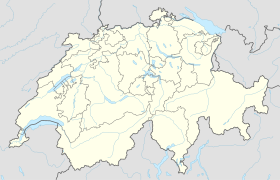Fontanezier
| Fontanezier | ||
|---|---|---|
| State : |
|
|
| Canton : |
|
|
| District : | Jura north vaudois | |
| Municipality : | Tévenon | |
| Postal code : | 1423 | |
| former BFS no. : | 5558 | |
| Coordinates : | 540111 / 189466 | |
| Height : | 835 m above sea level M. | |
| Area : | 3.73 km² | |
| Residents: | 58 (December 31, 2010) | |
| Population density : | 16 inhabitants per km² | |
| map | ||
|
|
||
Fontanezier was a municipality in the Jura-Nord vaudois district of the canton of Vaud in Switzerland . On July 1, 2011, the municipality of Fontanezier merged with Romairon , Vaugondry and Villars-Burquin to form the new municipality of Tévenon .
geography
Fontanezier is 835 m above sea level. M. , eight kilometers north of the district capital Yverdon-les-Bains (as the crow flies). The farming village extends on the southern slope of the foremost Jura chain , in a panoramic position around 400 m above the lake level of Lake Neuchâtel .
The area of the 3.7 km² former municipal area comprises a section on the upper slope of the Mont Aubert chain . The municipal soil extends from the cleared island of Fontanezier northwards over the steep slope of La Côte to the height of Le Crosat . This forms with 1365 m above sea level. M. the highest point of Fontanezier and represents the western continuation of Mont Aubert. The area extends north of this height with a narrow tip into the basin of La Roguine . In this area there are extensive Jura high pastures with the typical mighty spruce trees , which either stand individually or in groups. In 1997, 2% of the municipal area was in settlements, 49% in forests and woodlands, 48% in agriculture and a little less than 1% was unproductive land.
A few individual farms on the Jura heights belonged to the municipality of Fontanezier. Fontanezier's neighboring communities were Tévenon , Provence and Bonvillars .
population
With 58 inhabitants (as of December 31, 2010) Fontanezier was one of the smallest communities in the canton of Vaud. 88.6% of the residents are French-speaking, 10.0% German-speaking and 1.4% speak Portuguese (as of 2000). The population of Fontanezier was 159 inhabitants in 1850, after which it decreased to 108 inhabitants by 1900 through emigration. Since then, a further decrease of around a third has been recorded.
economy
Fontanezier still lives from agriculture , although there is some arable farming near the village , while cattle and dairy farming predominate in the remaining areas . Outside the primary sector, there are no other jobs in town, which is why some workers work away from home.
traffic
Fontanezier is far away from the larger thoroughfares. The place can be reached by cantonal roads either from Champagne or Bonvillars . Fontanezier is connected to the public transport network through the Postbus course that runs from Yverdon to Mauborget .
history
The community area was cleared and made arable relatively late. The place was first mentioned in documents in 1403 under the name Fontanisy . The place name goes back to the late Latin fontana [aqua] ( well , source ), because there are several small springs in the area of the place. Fontanezier belonged to the Grandson rule in the Middle Ages . After 1476 Grandson became a bailiwick under the common rule of Bern and Freiburg . After the collapse of the Ancien Régime , Fontanezier belonged to the canton of Léman from 1798 to 1803 during the Helvetic Republic, which then became part of the canton of Vaud when the mediation constitution came into force . The place does not have its own church, it belongs to the parish of Villars-Burquin .
Web links
- Community information
- Philippe Heubi: Fontanezier. In: Historical Lexicon of Switzerland .
- Aerial photography


